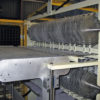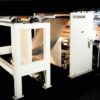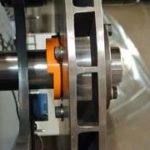Atlantic Packaging Corporation, like other growing and successful companies, has blazed a winding path to its present incarnation as a trade merchant of converted materials to the packaging industry. Getting here speaks volumes of management with a vision of the future and the will to respond quickly to market change and growth opportunity.
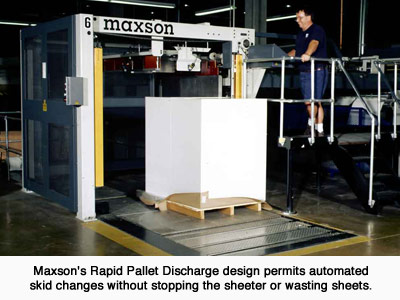 Privately owned Atlantic Packaging began fifty years ago as the Tabor City Tribune, a newspaper in Tabor City, North Carolina. The Tribune expanded into printing, became Atlantic Publishing in 1942, and then slowly added paper converting over the years. A recent decision to become more centrally located, precipitated the acquisition of a 150,000 sq. foot facility in Charlotte. “This was a strategy to place us in the middle of our customer marketplace and helps us to be extraordinarily responsive to their time constraints. It also puts us in a solid position to maximize our efficiencies and provide instant customer service,” said Russell Carter, President of Atlantic Corporation.
Privately owned Atlantic Packaging began fifty years ago as the Tabor City Tribune, a newspaper in Tabor City, North Carolina. The Tribune expanded into printing, became Atlantic Publishing in 1942, and then slowly added paper converting over the years. A recent decision to become more centrally located, precipitated the acquisition of a 150,000 sq. foot facility in Charlotte. “This was a strategy to place us in the middle of our customer marketplace and helps us to be extraordinarily responsive to their time constraints. It also puts us in a solid position to maximize our efficiencies and provide instant customer service,” said Russell Carter, President of Atlantic Corporation.
Also consistent with Atlantic Packaging’s plans for expansion was the acquisition of well-established Henley Paper, in High Point, North Carolina in 1999. In addition to the obvious benefit of assuming the extensive distribution of industrial products, a planned area of expansion, Atlantic also acquired additional converting equipment, including a state-of-the-art Maxson dual rotary knife sheeter. Determined to serve as the downstream bridge between paper manufacturers and high-technology commercial printers or folding carton manufacturers, Atlantic used these developments to expand to eight locations in North and South Carolina, and expand to 350 employees.
“We knew there was more business on the horizon but we needed more converting capacity to secure it,” says Geoff Searcy, Vice President of Converting Sales. “We see enormous potential within a 300 mile radius. We made the decision to buy two more Maxson DFK dual rotary knife sheeters and located them in our Charlotte facility. Atlantic has owned Maxson single knife equipment since the early 80’s and is very familiar with its performance. We can’t say enough good things about these workhorse sheeters.”
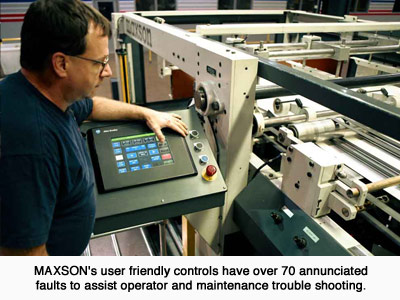 The Maxson DFK sheeters are fast and efficient; capable of speeds up to 1300 fpm. Dave Robinson, Plant Manager of the Charlotte facility remarked, “Once the DFK sheeters were installed, we relocated some of our operators from the Wilmington plant and they got exceptionally good product right off-the-bat. We are converting mostly SBS, with cutoffs ranging from 76 inches to 80 inches. We’re also running foils at speeds in excess of 1,000 fpm at a 90% overlap with no marring.”
The Maxson DFK sheeters are fast and efficient; capable of speeds up to 1300 fpm. Dave Robinson, Plant Manager of the Charlotte facility remarked, “Once the DFK sheeters were installed, we relocated some of our operators from the Wilmington plant and they got exceptionally good product right off-the-bat. We are converting mostly SBS, with cutoffs ranging from 76 inches to 80 inches. We’re also running foils at speeds in excess of 1,000 fpm at a 90% overlap with no marring.”
Atlantic opted for a variable Airfoil Overlap System that enables shortening or lengthening overlap depending on material. With the touch of a button, this system can enhance speed by as much as 300 fpm. “Essentially, the DFKs are single operator machines with an additional individual occasionally utilized to make-ready a roll at the roll stand, offload finished piles from the stacker, or shrink wrap a finished skid. This is possible because the operator control station utilizes a touch-screen panel and computerized entries dictate the function of the machine.
On an average nine hour day, each DFK sheeter is producing 50,000 to 60,000 lbs., and that includes roll changes and size changes. “That’s with one shift, but we’re adding a second shift shortly and expect to double production,” added Robinson. There is some good spirited competition between the operators of the sheeters with the winner-to-date completing a roll change in 3 minutes, a cutoff change in 10 minutes, and a cutoff and width change in 20 minutes.
Expeditious roll changes are made possible by features of the pivot arm roll stand that moves out of line on rails when a roll is exhausted. Rolls up to 10,000 lbs. with a maximum roll width of 110 inches can be placed between two self-loading armatures that, with the aid of hydraulic motors, chucks the roll and lifts it into place. Safety is promoted since the need for overhead hoists is eliminated.
Both cutters are equipped with easily accessible, yet safely guarded Class III air-loaded slitters providing two-pile service. Low inertia composite knife revolvers and cyclic drive system ensure cut accuracy of ±0.015 inches. Robinson said, “Our emphasis is on cut quality, and we consider the DFKs to be ‘super’.”
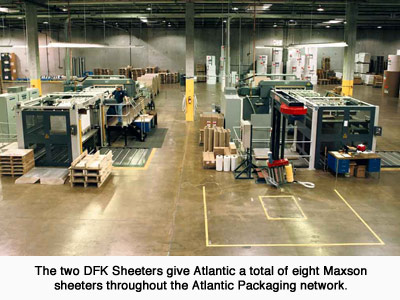 The Maxson DFKs are equipped with a continuous run feature that accumulates sheeted material in the tape section just before the stacker. This permits the stacker table to be lowered, finished piles to be offloaded, empty skids to be placed and table raised into position before the accumulated material is moved to the fresh skid with zero sheet lose. “With the exception of just a few sizes, we don’t even ramp down the machine speed for this. This is non-stop production,” remarked Robinson.
The Maxson DFKs are equipped with a continuous run feature that accumulates sheeted material in the tape section just before the stacker. This permits the stacker table to be lowered, finished piles to be offloaded, empty skids to be placed and table raised into position before the accumulated material is moved to the fresh skid with zero sheet lose. “With the exception of just a few sizes, we don’t even ramp down the machine speed for this. This is non-stop production,” remarked Robinson.
Each DFK Sheeter is outfitted with stackers that can accommodate a 61” pile height, however, one stacker is a Maxson 600 stacker that can handle the longer 80 inch sheet lengths and weights up to 8,000 lbs.
The two new DFK Sheeters give Atlantic a total of eight Maxson sheeters throughout the Atlantic Packaging network.
Reprinted from Pulp & Paper, October 2001


